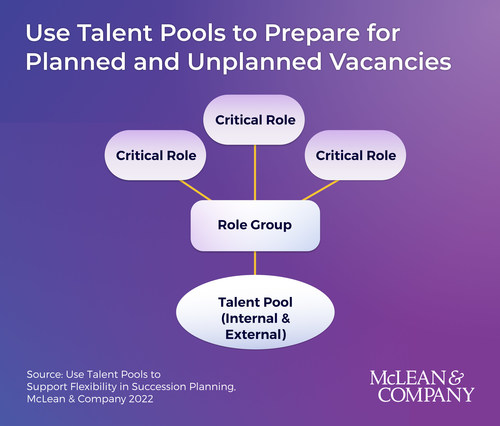McLean & Company, the trusted partner of HR and leadership professionals around the world, has released its newest research-driven resource, Use Talent Pools to Support Flexibility in Succession Planning. Succession planning plays a critical role in overall business success as organizations consider resourcing plans for the coming months, making the release of this industry resource particularly timely.
While traditional succession plans are often considered ineffective in dynamic work environments, McLean & Company’s industry resource is intended to help organizations use talent pools to create role groups to develop cross-functional capabilities for more effective planning in an uncertain climate.
The research indicates that talent pools are a source of potential successors for a specific role group that consists of more than two individuals. In a talent pool, the grouping of critical roles requiring similar or comparable competencies such as knowledge, skills, and attributes is called a role group. To put it simply, role groups can share a talent pool of potential successors who may be viable candidates for any of the roles within the group. “Succession planning has evolved into a key business imperative that continuously supports an organization’s ability to maintain and grow talent for critical roles at all levels,” says Mardi Walker, executive counselor at McLean & Company. “With the ongoing uncertainty and challenges in the labor market and economy at present, it is especially important for organizations to have talent pools in place.”
According to McLean & Company’s research, in order for organizations to plan for succession efficiently and successfully, the approach must keep up with rapid changes in the work and operating environment. Organizations need to build their talent pipeline from within to ensure critical roles are filled with the best talent and to reduce vacancy periods, especially during a period where recruitment efforts are particularly challenging. Using talent pools and role groups broadens the opportunities for internal career mobility and improves retention.
“Effectively using talent pools allows organizations to not only be nimble in responding to unexpected workforce changes, but to provide the development and growth opportunities employees want and expect,” explains Walker.
McLean & Company’s research explains how talent pools add flexibility to succession planning and can provide organizations with numerous benefits, including:
- A database of qualified candidates – All talent pool members already possess the minimum skills and requirements for the role or role group, resulting in a larger number of potential successors.
- A better candidate experience – Having records of career goals, achievements, competencies, and performance enables organizations to customize development opportunities to individual employees. This increases employees’ awareness of future job prospects, strengthens engagement, and improves loyalty.
- Improved diversity, equity, and inclusion – Talent pools provide greater opportunities for diverse candidates, encouraging DEI across the workforce. They also disrupt the traditional method of applying for a specific role with specific criteria and allow for a wider consideration of talent.
- Reduced time to hire – Rather than searching through applications to identify suitable candidates, organizations can quickly identify qualified talent from within a talent pool and approach them directly.
- Decreased cost per hire – Talent pools give organizations access to a community of qualified and interested candidates. This saves the resources typically allocated for job advertising and external search activities.
- Access to potential passive candidates – Talent pool members are tailored to fit the organization’s needs and can be approached in a more targeted and personalized way.
HR leaders can download the new industry resource directly from McLean & Company. Use Talent Pools to Support Flexibility in Succession Planning provides the step-by-step process to guide organizations on successfully incorporating flexibility into and implementing the succession planning program.

